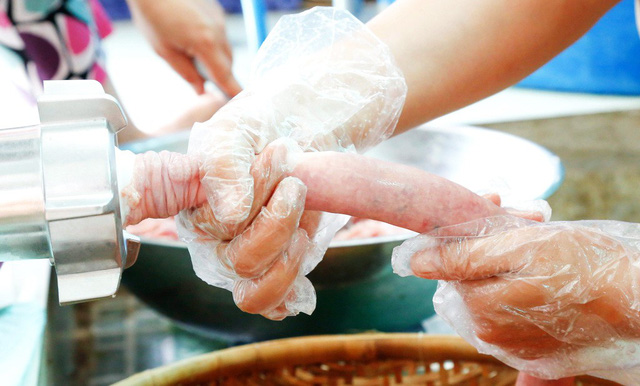While more and more consumers in Vietnam steer clear from industrially produced food, shifting to ‘homemade’ alternatives, out of fear for unwanted chemicals, health experts have warned that the latter also poses health risks, if bought from sources subject to no safety or hygiene regulations.
Some stores claiming to offer only home-produced food turn out to mass-produce their products using industrial machines.
A facility based in the Mekong Delta province of Vinh Long famous for their banana preserves claim to be able to sell two metric tons of the sweet snack every year during Tet, or Lunar New Year.
Despite marketing themselves as selling only homemade banana preserves, the establishment in reality operates no differently than a large-scale business, and even uses industrial machines to speed up the process.
“If we do it by hand, one worker can only finish two batches of banana preserves a day at most,” said L., an employee at the establishment.
“A machine can perform the task at four to five times the efficiency.”
Bui Thi Thanh Tuyen, who resides in Dsitrict 10, Ho Chi Minh City, said she was a fan of homemade food due to her fear of consuming unwanted chemicals from industrially produced food.
Tuyen has said she had just bought dozens of kilograms of food from homemade stores at between ten and 20 percent higher prices than they would have cost at regular outlets.
However, she admitted not knowing whether the products were actually home-produced, relying on recommendations from friends and colleagues.
Huong, a resident in Ho Chi Minh City’s Thu Duc District, said she had bought four kilograms of coconut preserves from a friend who had advertised the product on Facebook.
To her disappointment, the snack tasted strongly of artificial sweetener, and began to water after just a week.
Mai, who sells homemade smoked pork and buffalo meat, said she only took orders from friends and family members despite a growing number of strangers asking to buy the delicacy.
“I only prepare the food after receiving the orders, rather than make them beforehand and keep in cold storage,” Mai said.
She added that some homemade stores make profit buying mass-produced products and reselling them at higher prices simply by labeling the food as homemade.
Meanwhile, according to a food safety official from Vietnam’s Ministry of Health, there are currently no set of quality standards for homemade food, posing a challenge for authorities in inspecting homemade food producers.
“Administrative authorities cannot keep an eye on every establishment out there,” he said.
Like us on Facebook or follow us on Twitter to get the latest news about Vietnam!


















































